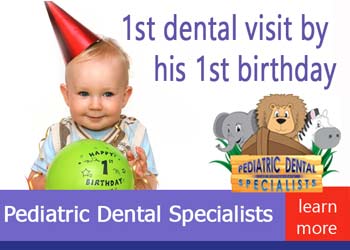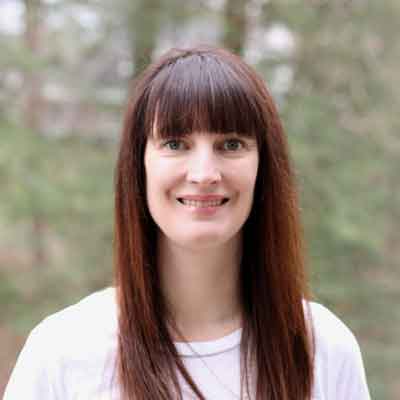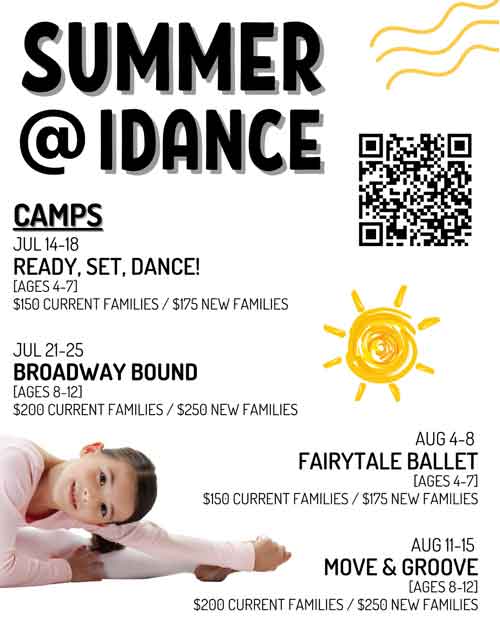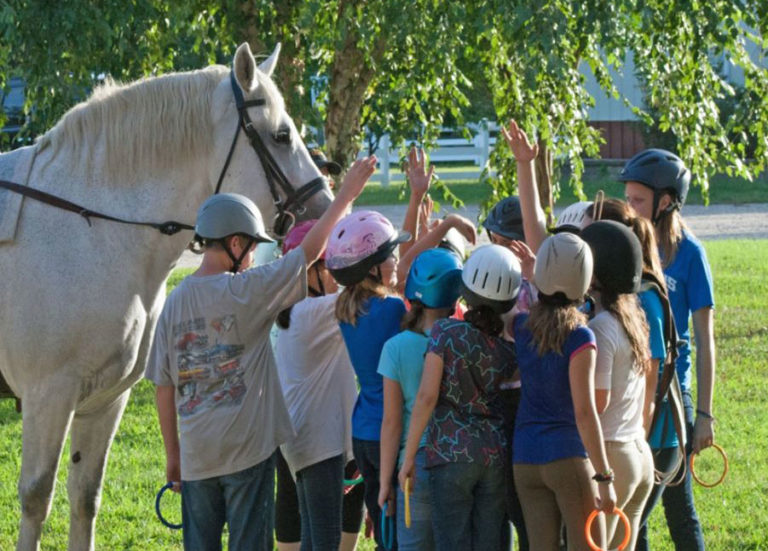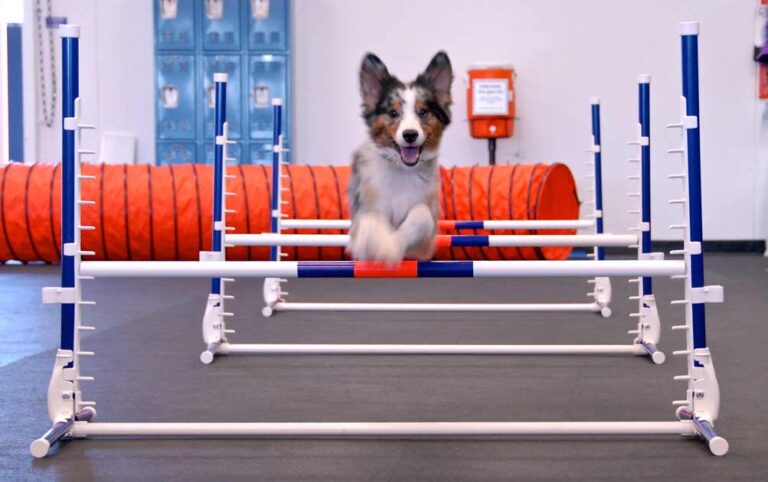Did you know you should have your baby’s first dental check up by their first birthday?

Article by Rana Graham-Montaque DDS, MS, MSD Pediatric Dentist
Did you know you should have your baby’s first dental check up by their first birthday? If you did not know this, you are not alone. Here is a Q&A on this topic with Dr. Rana Graham-Montaque, a Pediatric Dentist at Pediatric Dental Specialists in Williamsburg VA.
What is the age you recommend parents bring their children in for their first dental appointment?
Your child should have their first dental appointment by age 1 as recommended by the American Academy of Pediatric Dentistry and the American Academy of Pediatrics.
Why do they need to come when they may only have a few teeth?
Actually, most primary teeth have fully erupted soon after your child’s second birthday. Often I see patients too late and rampant decay may exist on teeth that have only been in the mouth for a year, so prevention is key. My favorite part about the one year old dental exam is educating parents about proper hygiene for their little one to prevent decay. Also, the fluoride varnish that we apply to the teeth is helpful with decreasing the risk of cavities too.
What can parents expect at the first appointment?
At their Age 1 First Dental Visit, we strive to make the appointment easy and comforting for your baby. Often a knee to knee exam where the parent is holding their child, a cleaning and fluoride treatment are completed at the first appointment. We also work with the parents to give advice on how to access their child’s tiny mouth and technique suggestions for age appropriate home care.
Are there things parents can do to prepare a young child for their first visit?
Reading a book sharing a positive experience about going to the dentist. Dora the Explorer and the Bernstein Bears have a popular book available. Positive reinforcement and parental excitement about the dentist visit is helpful. Your little ones feed off of your energy so if you are stressed or fear the dentist, they can pick up on your body language.
What do you say to a parent who is worried because their child has huge fears and they do not think that the child will be able to make it through an appointment?
The beauty of visiting a pediatric dental practice is that all of the staff members are trained to cater to children from birth to adolescence, as well as patients with special needs. There is not a one size fits all approach so we customize the visit to adapt to your child’s needs. A six year old child with extreme anxiety may complete a cleaning in their parent’s lap while an amazingly brave one year old sometimes sits in the dental chair alone and cooperates, as their parents cheer them on in a chair beside them. Your child’s appointment will be designed based on their needs and what they are able to handle.
Do you work with children with disabilities and/or social and emotional issues?
Pediatric dentists are trained in treating patients with special needs. We offer nitrous oxide, oral sedation, and general anesthesia for dental treatment that can not be completed under just local anesthetic due to dental anxiety or special needs that may limit treatment.
How important is a children’s baby teeth to their lifelong oral health?
A healthy mouth leads to a healthy body. The development of healthy baby teeth is critical to proper nutrition, speech development, and the ability to hold space for future adult teeth to erupt. Infected carious baby teeth can infect the future adult teeth. There was an unfortunate case in 2007 where a child in Maryland succumbed from a brain infection caused by an abscessed baby tooth. His name was Deamonte Driver. This situation is rare. However, it’s unfortunate that an infected untreated tooth caused cellulitis and a brain infection that ultimate cost an innocent child his life. Studies also link bacteria from the mouth to heart disease where the bacteremia adversely affects heart health and increases your risk of cardiovascular disease.
What are some habits can affect oral health adversely?
Baby bottle decay can occur on the front teeth from sending your child to bed with formula, cow milk, breast milk, soda or juice. If your child has a habit of nursing throughout the night make sure you brush their teeth when they are done or wipe the milk off of their teeth with a wet wash cloth. When age appropriate wean the child from nursing at will throughout the night or if they must have a bottle make it water over the high carbohydrates alternatives that break down into sugars thus causing a cavity. Also parents with decay can pass unhealthy bacteria to their child so be cautious of sharing utensils or excessive activities where saliva may be exchanged. A parents unhealthy bacteria can cause early colonization of baby teeth and put them at greater risk for decay.
What is the difference between a Pediatric Dentist and a Family Dentist?
After completing four years of dental school you become a general dentist or family dentist. A pediatric dentist is a general dentist that attends a two to three year residency for more specialized training in pediatrics. The specialty includes additional training in sedation, anesthesia, research, and orthodontics. After completing a residency and passing a rigorous two part exam you can become board certified in pediatric dentistry. In dental school most of the students may get two weeks or more a year in pediatrics so the residency is critical for learning how to properly care for primary teeth. Pediatric dentists are the pediatricians of dentistry.
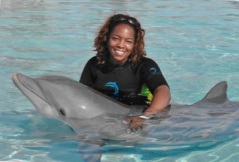 Rana Graham-Montaque DDS, MS, MSD was born in West Point, VA and attended Hampton University receiving a masters and bachelors in science. She attended Virginia Commonwealth University (VCU) and received a doctorate in dental surgery in 2006. Since graduation, she worked in public health dentistry as the dental director at the Daily Planet Healthcare for the Homeless in Richmond and started a public health dental clinic for Central Virginia Health Services in Fredericksburg, VA. Dr. Graham returned to VCU to specialize in pediatric dentistry after working as a general dentist and was awarded a specialty certificate and masters in dentistry in 2012. She passed the rigorous board certification and is now a Diplomate of the American Board of Pediatric Dentistry.
Rana Graham-Montaque DDS, MS, MSD was born in West Point, VA and attended Hampton University receiving a masters and bachelors in science. She attended Virginia Commonwealth University (VCU) and received a doctorate in dental surgery in 2006. Since graduation, she worked in public health dentistry as the dental director at the Daily Planet Healthcare for the Homeless in Richmond and started a public health dental clinic for Central Virginia Health Services in Fredericksburg, VA. Dr. Graham returned to VCU to specialize in pediatric dentistry after working as a general dentist and was awarded a specialty certificate and masters in dentistry in 2012. She passed the rigorous board certification and is now a Diplomate of the American Board of Pediatric Dentistry.
She is an active supporter of Virginia Commonwealth University School of Dentistry and serves as adjunct faculty at VCU and Thomas Nelson Community College Dental Hygiene Department. She is a member of the American Academy for Pediatric Dentistry, the American Dental Association, the Virginia Dental Association, and the National Dental Association. Dr. Graham has long standing ties to the Williamsburg community where her father, Randy, works at Colonial Williamsburg and her sister, Ione, is a local entrepreneur. During her spare time, Dr. Graham-Montaque enjoys activities with her husband, Rick and their two children. She enjoys staying active by running local races, horseback riding, and swimming. Dr. Graham-Montaque has started Pediatric Dental Specialists of Williamsburg, PLLC to offer a variety of services to children and special needs patients and is looking forward to serving the Williamsburg community and surrounding areas. And she swims with dolphins….
Pediatric Dental Specialists of Williamsburg, PLLC
213 Bulifants Blvd
Suite B
Williamsburg, VA 23188
(757) 903-4525









 Rana Graham-Montaque DDS, MS, MSD was born in West Point, VA and attended Hampton University receiving a masters and bachelors in science. She attended Virginia Commonwealth University (VCU) and received a doctorate in dental surgery in 2006. Since graduation, she worked in public health dentistry as the dental director at the Daily Planet Healthcare for the Homeless in Richmond and started a public health dental clinic for Central Virginia Health Services in Fredericksburg, VA. Dr. Graham returned to VCU to specialize in pediatric dentistry after working as a general dentist and was awarded a specialty certificate and masters in dentistry in 2012. She passed the rigorous board certification and is now a Diplomate of the American Board of Pediatric Dentistry.
Rana Graham-Montaque DDS, MS, MSD was born in West Point, VA and attended Hampton University receiving a masters and bachelors in science. She attended Virginia Commonwealth University (VCU) and received a doctorate in dental surgery in 2006. Since graduation, she worked in public health dentistry as the dental director at the Daily Planet Healthcare for the Homeless in Richmond and started a public health dental clinic for Central Virginia Health Services in Fredericksburg, VA. Dr. Graham returned to VCU to specialize in pediatric dentistry after working as a general dentist and was awarded a specialty certificate and masters in dentistry in 2012. She passed the rigorous board certification and is now a Diplomate of the American Board of Pediatric Dentistry.